University of Sydney Vice-Chancellor Mark Scott has apologised for “unacceptable” anti-Semitism suffered by Jewish staff, students and alumni during an eight-week pro-Palestinian protest camp.
Speaking before a Senate inquiry into antisemitism on campus, Professor Scott said it was unacceptable that Jewish students and staff felt “unsafe” during this period and that both he and the university had “failed” them.
“I have read the complaints that have been made to the university and all those submitted to this inquiry and to the special envoy, and the testimonies are heartbreaking and unacceptable,” he said.
“I’m sorry. No one should feel at risk, unsafe or unwelcome in any place of learning, and no one should feel the need to hide their identity or stay away from classrooms or campuses.”
Pro-Palestinian camps flooded into the university courtyard in April and remained there for about eight weeks before they were ordered to evacuate.
Professor Scott said it was a “difficult period for the university” and admitted the university’s response had fallen short of community expectations.
“On the one hand, I regret that we did not communicate the agreement to end the camp to the Jewish community before it was announced,” he said.
“I realize there is much work to be done to regain the trust of the university’s Jewish community, and I am committed to doing so.”
University of Sydney vice-chancellor and former ABC CEO Mark Scott has apologised to students for not acting more quickly

Sydney University feared a violent outbreak if the protest was forcibly dispersed.
Asked why the university did not intervene sooner, Professor Scott said he had looked at international comparisons on US campuses and believed acting sooner would have risked making the situation worse.
He said there were fears of a “dramatic escalation” in tension and the risk of violence if the university called in riot police to disperse protesters.
Following the protest, Professor Scott said the university had banned the camps and launched an independent review of relevant policies and processes.
“It was a complex and rapidly changing environment, where we were meeting daily and making multiple decisions based on the best information available to us at the time and following advice from experts, particularly from police and security agencies,” he said.
“Did we make all the right decisions during this time? There are clearly different opinions on this matter and I recognize that we did not always meet the expectations of the Jewish community.”
However, opposition education spokeswoman Sarah Henderson said Professor Scott had failed in his leadership and questioned why he had not banned camping on campuses and removed encampments sooner.
Although he did not call for Professor Scott to resign, he later told reporters that the university’s review was “too little, too late”.
“Whether or not he continues in his position is a matter for him, but I think he has fundamentally failed not only the Jewish students and staff at the university, but all students,” he said.

Senator Sarah Henderson has accused the University of Sydney of doing “too little, too late” to protect Jewish students and staff at one of the country’s largest campuses.
Earlier on Friday, Australasian Union of Jewish Students vice president Zachary Morris singled out the university as “probably one of the worst places to be a Jewish student”, saying the campus had “been problematic for a long time”.
Senator Henderson, who introduced the coalition bill to create a judicial inquiry into antisemitism on campuses, criticised Education Minister Jason Clare and the government for “not doing enough”.
“They have not shown the moral courage to tell these university vice-chancellors: this is not enough,” he said.
Alon Cassuto, chief executive of the Zionist Federation of Australia, said there needed to be a national model and a university ombudsman to monitor complaints of discrimination in universities.

The pro-Palestinian camps lasted about eight weeks before being closed.
“Anti-Semitism is not even one of the options you can check when filing a complaint against discrimination,” he said.
He added that even when policies were in place, he did not believe university administrators were enforcing the rules.
“I think the university administration has the ability to take action, but they’re just not doing it, and so we need to examine why that is,” he said.
In defence of universities, G8 deputy chief executive Matthew Brown said the group, which represents Australia’s eight major universities, maintained that universities had to uphold freedom of speech.
Dr Brown also said he believed social cohesion was “under threat”.
“Young people are becoming radicalised long before they reach university and we need to address this at a societal level,” he said.
(tags to translate)dailymail

